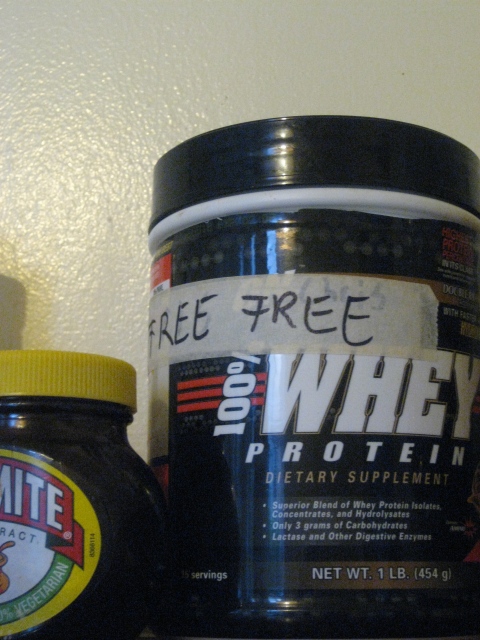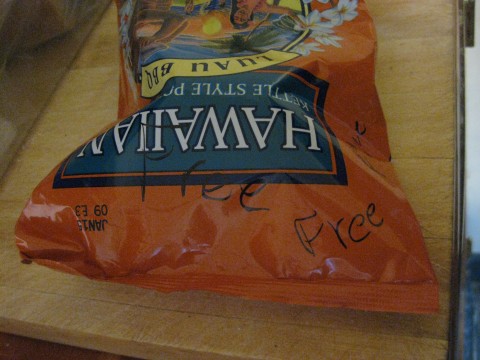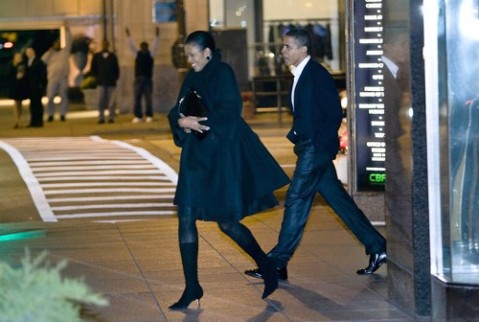What would that involve?
December 30, 2008
I had the great fortune of hearing Marilynne Robinson read yesterday morning at the MLA conference here in San Francisco.
This exchange from the last pages of Gilead feels so resonant of the circumspect way I frequently receive the generosity of existence:
The narrator, John Ames tells us, of his exchange with Jack Boughton,
“Then I said, The thing I would like, actually, is to bless you.”
He shrugged. “What would that involve?”
My friend Vajra offered me an orange as I was leaving the other day. No thanks, I just had one, I told him. I didn’t feel I had room in my backpack to carry anything else. He said, you shouldn’t be so stingy with these satsuma oranges. And I remembered, Yes, part of generosity, or maybe even, not stealing, is actually receiving what you’re offered. He agreed. I still didn’t take the actual tangerine, but did take the tipoff it had prompted.
The satsuma exchange felt like a warm-up so I wouldn’t miss it when the subject came up again that evening when Lou Hartmann gave a dharma talk. He spoke of his sense of dealing with the cognitive changes that come with being 92 years old. He talked of how when offering someone a newspaper article, he’d had something clear in his mind to say about it, but in his estimation, hadn’t managed to say it.
He may not have been talking about the exchange he and I had just had, standing at the bottom of the stairs a few days before, over a book review he’d set aside for me. I hadn’t noticed any struggle on his part, only my own mix of appreciation, overload, and hurry, again, on my way somewhere. Where? And the familiar feeling of having too much in the backpack that is my mind, and so i didn’t receive his offering with the space or appreciation it deserved.
But later I went and got the Book Review from his mailbox where he’d left it for me, and sat there and read it, in the strange and comforting light of reading something a friend has given you, puzzling through, what was it, that of everything that passes under his eyes, he wanted to pass on to me? It’s you, the friend, and whatever you’re reading, sitting there together. Lou, Carolyn Chute, Stacy D’erasmo, and me, sitting on the bench by the courtyard.
So much tenderness always there.
In Gilead, a few lines later, John Ames tells us,
“[Jack] took his hat off and set it on his knee and closed his eyes and lowered his head, almost rested it against my hand, and I did bless him to the limit of my powers, whatever they are.”
Later,
“Theologians talk about a prevenient grace that precedes grace itself and allows us to accept it. I think there must also be a prevenient courage that allows us to be brave–that is, to acknowledge that there is more beauty than our eyes can bear, that precious things have been put into our hands and to do nothing to honor them is to do great harm.”
In this, I heard articulated my greatest ongoing operational problem as a writer, how to respond, with anything but overwhelm, to this constant sense of “receiving more beauty than our eyes can bear.”
Having asked Robinson countless times for instruction in this problem through her exquisite novel, Housekeeping which turns these “precious things” into sentences that keep opening and opening with, as Anatole Broyard says “a fondness for human beings we thought only Saints felt,” there in the Q &A, I could ask her in person for help. I can’t remember her exact words, what I mainly felt was the recognition in her face when I posed the question, the encouragement of that, the feeling of being blessed. And what I took from what she said was, Yes, it’s impossible, but we try, and we’re always writing something other than what we intend.
And as the sculptor, Elizabeth King told me once, we’re always doing more than we think we are.
What can we do, but work to “the limit of our powers, whatever they are?”
Put it in the small kitchen––someone will eat it.
December 28, 2008
Shundo said this of a cookie that was broken and therefore not suitable to serve for tea. It is another exemplar of a category many small kitchen items fall into: the broken and perfect. It is satisfying to see these items find such swift dispatch.
Eating such a cookie is probably what led Dogen to say “no [creature] ever comes short of its own completeness. Wherever it stands it does not fail to cover the ground.”
With an eye toward taxonomy, I wanted to take a picture of it, one peanut butter cookie, cracked along one of its forkscore lines, in a white bowl at the center of the table. But of course it was gone before I could come back with my camera.
shirtless
December 24, 2008
My friend Jennie suggested that I continue exploring the concept of the “offered” in reference to the “shirtless in Hawaii” photos.
Here is a stretchy interpretation what constitutes an offering–“tacit approval”– from Frank Griffin who published the photos.
“The paparazzo had tacit approval to shoot Obama since it’s a public beach.” “The guy just walked along there. He had a camera in his hand. He wasn’t hiding behind the bushes. He took some pictures. Everybody saw him. And then he walked off,” Griffin said. “It was as simple as that…”
Yes, very simple. And then he adds, in that way children do, introducing new material in a negated clause, “He wasn’t hiding behind the trees, he wasn’t on a boat…” A boat? Is this where he draws his line? That when a person takes up a post offshore with a long lens, that’s when he feels a bit squeamish about consensuality? Everything before that was fine…just a photographer on an ordinary day at the beach, collecting a few shells, eating some Luau BBQ chips, snapping a few photos of the president-elect.
Right now, I have some 3-D holiday matters to attend to, dipping this and that in chocolate, sewing some tiny books, etc. but I just want to say that the phrase “a slideshow of other shirtless presidents,” is as frightening a sequence of words as I’ve encountered in a while.
It reminds me of how I love those fine lines so exquisitely laid out in Speech Act Theory, as for example the gradations along which a promise or offer becomes a threat, as in “Here, won’t you try a slice of Aunt Angie’s Fruitcake? It just came in the mail.”
**See a slideshow of other shirtless presidents**
I still have not clicked this link.
Offered
December 18, 2008
The second Zen Bodhisattva precept cultivates the practice of taking only what is offered.
This is a very robust precept and while most of us do not rob banks, it’s instructive to inquire into the more subtle forms of stealing we engage in. I decided once during a Sesshin, a seven-day silent retreat, to notice the ways I was stealing. From myself, it’s a constant pilfering–of energy, an ongoing undercutting of intentions with a barrage of questions and judgments.
And, even in silence, I found I was always casing other people: what does that person have that I want? Paul Haller commented that when he was a Theravadan monk, and all anyone possessed was a robe and a bowl, it came down to comparing bowls. So it’s that persistent.
I tend to skip over wanting the bowls of the person (if anything, I like mine better, but that’s another precept.) right to wanting the actual person. For example, in yoga class, watching someone demonstrate Setu Bandha Sarvangasana, bridge pose, I’d be thinking, hmmm, so this is what he looks like on his back. Providing more specific data to furnish my lively sesshin fantasies was not, I think, what this person intended to offer.
There are several ways items are offered in the small kitchen.
There are the chance offerings, left when someone moves out, some of which undergo no diminution with time, as with the forsaken canister of vanilla whey powder, which only ever gets lifted up when someone dusts the shelf.

Or esoteric herbal tinctures. Of course echinacea would be snapped up immediately, but the shativari, which I just learned is for female reproductive health, the secret of “she who possesses a hundred husbands,” has gone untouched since Spring. Let us not draw conclusions too hastily about the place of reproduction and body-building in this building. Anything can happen at any time.
But these slow movers are the exception. Mostly, what appears with a masking tape label marked Free in Sharpie marker quickly disappears.
When these offerings appear, people always want to know how they got there. Small creation myths involving conferences and birthday parties take shape. Funerals are usually a boon for the small kitchen. Over such displays, the fruits of impermanence furnished forth from the funeral table, there prevails a climate of great gratitude, a flush feeling.
Sometimes the provenance remains a mystery, as with this bag of “Kettle style Luau BBQ” chips that appeared one Sunday morning on the breadboard.
 The benefactor wrote Free three times on the bag.
The benefactor wrote Free three times on the bag.
Was anyone thinking of luau chips before they walked into the small kitchen that Sunday morning? I certainly wasn’t. But they took on an imperative and became an organizing force, tipping the strategy more toward lunch than breakfast. Toward hummus and away from oatmeal. Yes, only a few posts into this blog, and already I’m actually talking about what I had for lunch.
This is one of those packaging concepts that feels it must call forth an entire party scene to communicate the promise of the contents. That most of these products are consumed quickly in the solitude of cars and corporate cubicles lends a kind of poignancy to the enterprise
Then there is the core offering of the snack array, the aforementioned white bowls of tahini, jam, etc. This is on the counter next to the bread tray. It is known and requires no special label marking it as offered.
At breakfast the coffee belongs to a special category. From what I can gather, it is available, but it is not offered. Although Zen Center buys the coffee, the coffee makers, the supplies, and it is someone’s job to prepare it, this does not constitute an official offering. This is why it’s in the small kitchen instead of the dining room where there is plenty of space. This is why people crowd into this space holding bowls of oatmeal and scrambled tofu on their way to the dining room.
Shundo, the current Tenzo (head of kitchen) explained that it simply isn’t practical to move the whole coffee service back and forth to the dining room and I can appreciate the pragmatic sense of that, and anyway, I like the strange traffic of the early breakfast small kitchen.
What started me thinking of this concept of “offered” is Obama’s underwear. Yes, this was discussed at large in February, but I only read about it a few days after the election in a recap of the campaign in the Times.
Does the beloved wear boxers or briefs?
He’s not saying.
I’m not going to answer those humiliating questions, he told US magazine, But whichever it is, I look good in them.
Who didn’t already know that?
The sociologist Erving Goffman marked certain interactional “goods” as free. These include, classically, directions to a nearby place, and the current time, “goods” pedestrians can reasonably expect one another to be able to provide for each other, and such requests require no deferential heroics, no, “I know this is a strange question, but…” usually just a simple excuse me and perhaps an apology for bothering the person.
There’s a way this applies to what one can reasonably ask in an interview. The way the interviewer asked this question without a hedge, suggests a sense that this category extends to any public persona’s undergarment. I love that Obama declines to offer this as a free good.
No. I’m not going to answer that. But then he does something better: he invites us to imagine. Not that I needed the invitation.

At last a president who knows the power of imagination, and who invites us to use it, not to imagine stores of hidden weapons of mass destruction, but to imagine him in his underwear.
After years of being asked to imagine threats at every turn, it is such a relief to be invited into this flicker: Obama in boxers. Yes we can. Obama in briefs. Yes we can.
Obama clearly understands, as Roland Barthes wrote in The Pleasure of the Text,
“it is intermittence… which is erotic: the intermittence of skin flashing between two articles of clothing (trousers and sweater), between two edges (the open-necked shirt, the glove and the sleeve); it is this flash itself which seduces, or rather: the staging of an appearance-as-disappearance.”
Only it’s not the actual glimpse of the actual waistband. While saying he’s not going to tell us, he tells us more by just flashing a quick glimpse of his own sense of himself in his body. The object becomes subject. It’s strange how effective this sentence is: he’s not giving the information but he’s giving the effect. Not the peach, but the gleam on the peach.
Intermittence: We’re left not with some kind of finite set: okay, so he wears boxers. And then everyone can all rest in his guarantee that he’s wearing boxers. And then the world settles down and boxer sales go up.
No. Even here he’s not willing to inculcate binary division.
Boxers or briefs?
Not red. Not blue
Not one, not two.